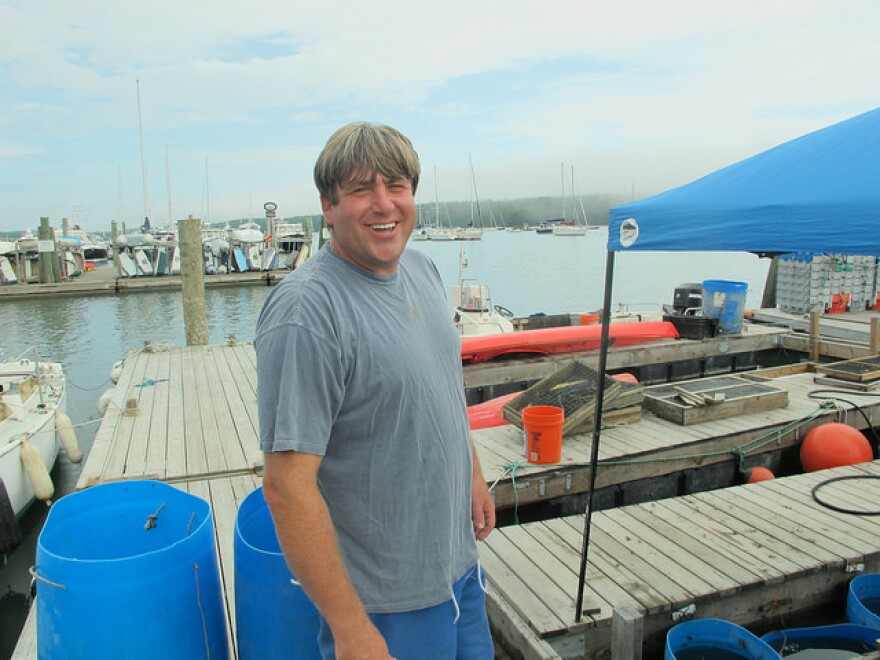HARPSWELL, Maine — A vigorous debate is underway concerning access to Maine's intertidal zone.
At the heart of the dispute are the regulations around clam harvesting, which are set by local municipalities, and the state rules governing the taking of bloodworms.
A law went into effect this week that adds new protections for Maine's shellfish population, which has been devastated by the invasive European green crab, but many of Maine's 800 or so worm diggers see the law as an unjustified effort to control their activities.
Dan Harrington trudges through the mud flats at low tide at Dipper Cove on Orr's Island in Harpswell. He's on a so-called spotting mission for bloodworms, which are popular as bait for recreational fishermen.
He's president of the Maine Marine Worm Harvesters Association.

Moving swiftly through the thick mud, he hand-rakes several different spots trying to gauge whether there are enough of them here to merit putting in day's work digging.
"As far as blood worms go there's usually a few here but," Harrington says, trailing off.
He is in his mid-40s, tall and bearded. He has been worming for 35 years, although on occasion he's had to dig for clams, he says, because the worm harvest ebbs and flows.
He digs down about 3 or 4 inches into the mud. After a few minutes, success.
"That's a 4 1/2 inch worm, and if you were going fishing, that's a usable bait," he says.
Bloodworms are pink colored and can be aggressive: When provoked, they'll bite with four retractable fangs.
"If I can grab it like that, you can see the black teeth, and some people have almost like an allergic reaction to a bite," Harrington says. "I get bit all the time."
Worm bites aside though, Harrington says it's a way of life he enjoys for a number of reasons.
"The idea that you're a free agent for one, and the idea that, you know, to get a little personal, I feel that when I go out on the mud I'm as close to God as anybody can possibly be," he says. "I'm surrounded by nature."
Worm digging has been described as the last free industry in Maine. That's because all you need is a $50 state license, Harrington says, then you're free to roam up and down the coast searching for the sometimes elusive bloodworm, and its less valuable cousin the sandworm.
Wormers and clammers often work the same areas, Harrington says, and sometimes they do get in each other's way. But he's keen to stress that talk of a simmering dispute between the two sets of harvesters is often exaggerated by the media.
Nevertheless, worm diggers like Harrington are worried that their freedom is under threat. Under a new law, municipalities can now set limits on worm digging in an effort to protect clams.

Harrington's ultimate fear is complete municipal control of the worm harvest.
"Which would have a devastating effect on the whole entire industry, especially considering that 40 percent of professional worm harvesters do not live in coastal towns, and municipal ordinances are only required to sell 10 percent of their municipal licensing to nonresident license holders," he says.
"What we're looking to do is to protect the intertidal area," says Mark Latti, chairman of Brunswick's Marine Resources Committee. "Things have gotten worse out there."
Brunswick recently hosted a meeting of 10 surrounding municipalities who came together specifically to look at this issue.
The towns, he says, are united by concern over threats to their clam flats, which they're trying to reseed following the devastation caused by the invasive European green crab in recent years.
Latti says they want the flats closed to all activity.
"We're looking to protect areas from harvesting, from clam harvesting, from worm harvesting, from seaweed harvesting," he says. "We want municipalities to have the ability to close an area and allow that area to rehabilitate itself."
These efforts received a boost on Oct. 15, when the new state law went into effect that prohibits the disturbance of shellfish harvesting areas until juvenile clams reach harvestable size.
A similar proposal, currently in draft form, is also aimed at protecting conservation areas from worm digging.
Proponents say these are important steps in support of Maine's $19 million soft-shell clamming industry, which employs more than 1,500 people.
But many clammers also oppose this strategy.

"We don't support conservation closures as a management tool," says Chad Coffin, president of the Maine Clammers Association. "It misses the point that we really need to start moving toward protecting the bounty of the ocean right now that we know we have."
In other words, protecting clam populations from predators, such as the green crab. That's also the opinion of Dr. Brian Beal, professor of marine ecology at the University of Maine at Machias who has studied the issue in depth.
"Just simply closing an area doesn't cut it, it doesn't enhance the number of clams that are there," he says.
Beal says that while clamming, and to a lesser extent worming, can both damage the recovery of juvenile clams, by far the biggest threat is predation, and towns need to adopt a more "hands-on" approach to deal with it.
"Using fences, using netting, doing something other than just simply saying, 'This area is off-limits,'" he says.
Unless they're going to take that kind of action, Beal says, towns might as well let worm digging go ahead. But that's not the plan in the midcoast, where Brunswick and other towns plan another meeting on clam flat closures in November.


